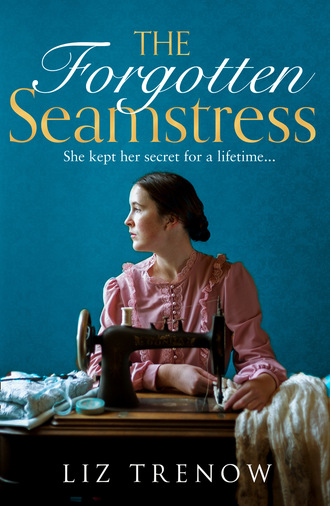
Полная версия
The Forgotten Seamstress
There was hundreds of servants, not to mention the upstairs lot. The two maids who shared our bedroom had to get up early every morning to make fires so we barely had any time to speak with them. They was nice enough, but kept themselves to themselves, at least till we had been there a few weeks.
We spent our days in the needlework room doing mending for the household, and for the rest of the servants too, and there was only the three of us: the chief needlewoman, Nora and me. It was a small white painted room with no furniture save for the three cutting tables and hard chairs, with high wide windows and the floor painted white, too, what we had to sweep and wipe clean every day. There was no fire, on account of the coal dust would soil our work. Instead there was hot water pipes which we put our feet on when we was working, it were that cold sometimes.
The chief needlewoman, Miss Garthwaite, was surely the ugliest woman we’d ever seen. Not as large as Mrs Hardy, mind, but she made up for it with several double chins and warts on her eyelids and on her hands too. Though she tried very hard to hide them, if she ever touched us we’d shiver and have to make an excuse and run to the toilet to wash ourselves, just in case. Her voice was right posh and we wondered where she’d got that way of talking and how she’d ended up in service. We reckoned she must have been born to a good family but they couldn’t find anyone ugly enough to marry her and take her off their hands.
At first she treated us like we was something blown in off the street but after a few days she softened up, especially when she saw we was quite good at needlework. That didn’t stop us having a laugh at her expense: Nora would go on about finding a toad in the pond at the park and bringing it back to cure her. ‘My prince has come,’ she (that is, Nora) would say all hoity toity, ‘when shall we be married?’ And she’d give the toad (which was a rolled-up sock, or a pincushion) a great smacker on its slimy lips, and the toad (that was me in a deep growly voice) would say, ‘I may be able to cure you, Missus, but I ain’t marrying you, warts or no warts.’ We laughed a lot, Nora and me, when we was just the two of us against the rest of the world, or so it seemed.
They gave us three meals a day in the second servants’ hall and cocoa at night. The food was good, better than at The Castle, and in the evenings the people who weren’t cooking or serving used to sit by the fire and read and smoke and gossip, which is how we learned about who we were working for, and where we were living.
Well, you may not believe me, and the psychiatrist fella says I’m making it up, but it turns out that the grand lady of the house wasn’t a duchess after all, but had become a princess because, canny soul that she was, she’d married a prince, Prince George, who was about to be king because his old dad had died. King of England! And more than that, this place we was living in was Buckingham Palace! We nearly fell off our chairs when we first heard it.
She erupts into a chesty laugh, which turns into a cough.
Sorry about me cough. Don’t mind if I stop for a gasper, do you, always helps to calm it?
‘Please go ahead, Maria.’ The sounds of cigarette packet, lighter, an inward breath and a sigh that seems to clear the cough.
Of course I don’t expect you to believe me either, dearie, not many do. It sounds a bit unlikely, don’t it, little old me working at Buckingham Palace? But you can ask Nora – she was there. Well, we didn’t even believe it ourselves at first – thinking we must have understood it wrong but later we found out it was the truth. Fancy, Nora and me working for the future Queen of England! Her name was May, which seemed to us the most beautiful name in the world and after that, on the warm spring days when we was allowed out for walks in St James’s Park, we’d make ourselves daisy-chain crowns and dance under the hawthorn bushes pretending that we were both Queens of the May.
Well, the household was all at sixes and sevens because so many important occasions was about to take place. A coronation in June when May would become Queen Mary, and after that the oldest son, whose name is David, was to be what they call invested as Edward, Prince of Wales. Why those people had to keep changing their names was a mystery to us. What would be wrong with Queen May, or Prince David for that matter?
Of course we never met any of them because our lives was lived downstairs, and we weren’t involved in the planning because all the robes and gowns were made by official costumiers and designers and all the fittings took place in the royal rooms, where me and Nora had never been and never expected to. But there was such an air of excitement and tension everywhere, and because of so much coming and going, so many visitors and suchlike staying at the palace, we got more and more repairs to do: darning socks and stockings, mending torn seams, taking up hems, letting out or taking in darts.
We never knew whose clothes we was working on – Miss Garthwaite kept all that close to her chest – but we could tell they was just servants’ clothes. Not the housemaids or outside servants of course, but the housekeeper, the butler, the valets and the ladies’ maids, we did their mending because they were too busy to do their own and because they had to be dressed perfect every time they went upstairs.
After a while, Miss G came to trust us and started to give us more complicated work on interesting pieces which, we guessed, might belong to the lords and ladies, as some of them fabrics was so soft and beautiful, and the designs like paintings you would want to hang on your wall. Their names were strange to our ears – brocade and black bombazine, chiffon and crêpe de chine, cashmere and organzine – and this made sense when Miss G told us that most silks were called by French words, on account of the weavers who came across the Channel in the olden days.
Every now and again she was summoned upstairs to make a last-minute mend, or adjust a hem or a dart which the ladies’ maids or valets didn’t have time for, and this turned her into a right flap. When she got back she would be flustered and huffy, snapping at anyone who dared to talk. It would take her a good hour or so to recover her nerves.
As Coronation Day came closer there was more and more work for us, and Miss G got called more often, to the point that one day we thought she might just go pop with the stress of it all. She never said what she had been doing or who she had been helping, and we wasn’t allowed to ask her, but my curiosity was so keen I felt like a kettle boiling with its lid clamped on tight. When she went out and left us on our own we had a good laugh, Nora and me, and would sometimes get up and jump about a bit just to let off steam.
On the big day even the underlings like us was allowed to look out of a window on the fourth floor which overlooked the palace gates and The Mall. Well, I’ve never seen so many people in one place, not before nor since. There must have been millions, like when you stir up an ants’ nest by mistake and they all come swarming about, only this lot were so packed in there was no room for them to move, so they were just standing and waving.
There was a long procession of red and gold uniforms on horseback and eventually there was the top of the coach which looked like a crown itself, and though of course we couldn’t see inside ’cos we were looking from so high up, they told us it was Prince George and Princess May, who would come back as King George and Queen Mary. When the crowd saw the coach we could hear a cheer like a roar of thunder which went on for the whole time till everyone had passed, and then we had to go back to work.
In the evening we was told there’d be a ten-course banquet for a hundred guests and the chefs and kitchen staff were frantic so we kept well out of their way, and after our supper we were sent back to work because Miss G kept getting summoned upstairs to help the ladies’ maids and valets with emergency repairs to ballgowns and penguin suits.
The following day the fuss and bother continued, what with all the visiting royalty, and our meals were weird and wonderful left-overs from the banquets: I had never eaten venison before and I was enjoying it till they told me it was deer, them pretty little animals we used to spy in the parks in the early mornings, and then I lost my appetite for it.
That day we overheard conversations in the staff quarters about the prince’s birthday celebrations, and how because he was next in line to the throne he would become king when his father died. There was a deal of discussion about who he would marry – German royalty or Russian? I remember feeling sorry for him, thinking how strange it must be to have your life all mapped out for you. Of course I never understood that I had precious little control over what happened to me, neither. Like all young girls I believed I would fall in love and marry who I liked, and if they had enough money we could have our own little place and not live in servants’ quarters for the rest of my life. If only I’d known what life had in store – what a joke fate would play on me.
A couple of days later after the Coronation, Mrs Hardy calls us servants together after breakfast and tells us to make sure we’re dressed extra-smart, polished shoes and the rest because we had been summoned. We hadn’t a clue what this meant, but there was such an air of excitement it felt a bit like a holiday. We were gathered in the main hall at eleven o’clock sharp and it took a while for all two hundred of us to traipse up the stairs. At the top we went through a door into another world, a world of thick carpets and high ceilings, tall windows and larger-than-life paintings of grand people from history. Imagine two hundred people all walking in silence, and no footsteps to be heard because the carpets are that deep they swallow all the sound. I got ticked off for gawping with my mouth open at the mountains of glittering glass hung in the ceiling what I later found out were called chandeliers, not to mention the dazzling redness of the wallpaper and the glowing gold of flowery carvings where the ceilings met the walls. It was like what I imagined heaven to look like, not just someone’s home – hard to get your head around for an orphan girl like me.
Then we arrived in a room the size of a football pitch and got ourselves arranged in rows. I was at the front because I was so short, and Nora was right behind me. After a bit, in came Miss Hardy the head housekeeper, followed by the new king and queen and their children herded by a nanny. I couldn’t stop goggling at the lot of them, but it was the eldest boy who really caught my eye. He would have been about sixteen then, not tall but fair like a Greek god, and with a mischievous look on him.
They stopped in front of us and we all bowed or curtseyed like we was taught, only I put the wrong foot behind and realised too late and stumbled a bit as I tried to change it, and Nora caught me from behind to stop me falling over. When I dared to look up again my cheeks were burning but the golden-haired boy was smiling at me with a face like an angel giving me a blessing, and I couldn’t help but smile back till I caught the nanny glaring at me, and had to study my shoes again.
The king made a speech with that prune-in-his-mouth voice thanking us lot for the hard work that we had all put in to make their Coronation Day run smooth as clockwork, and the queen (our very own May) said something of the same, and then they went to leave, except that just as she turned, May looked directly at Nora and me and said quietly, ‘You two are my little needlework orphans, are you not?’ We both blushed fit to match the carpet but Nora was the first one to find her voice. ‘That’s right, Your Majesty,’ she said, nipping in an extra little bob curtsey.
May said, ‘I hope you are settling in well?’ and this time I managed to reply, ‘We are very happy, thank you, Ma’am.’ She smiled and said, ‘Very good, very good,’ and walked out with the rest of them.
Well you can imagine that Nora and me was on cloud nine for days afterwards; she because the queen had talked to us, and me because I was head-over-heels in love with the boy. Of course I knew this was stupid, but if others could idol-worship their music-hall heroes I reckoned that surely I was allowed my own?
Over the next few days, by sneaky questions, I managed to find out that this was the same boy whose birthday they celebrated the day after the Coronation Day, the boy who will marry some German or Russian princess and eventually become king. Apparently he attended naval college and now was going to become Prince of Wales, which I thought rather curious. Wales is part of Great Britain, so why should it have its own prince? And why not Scotland or Ireland? It was very confusing.
After the fuss and bother of the Coronation it went quiet for a few weeks, which was just as well because there was a summer heatwave and we sweltered in the sewing room with its high windows barely catching the breeze. Miss G felt it the worst and had to have a cloth nearby to wipe her hands on every couple of minutes to save staining her sewing with sweat. Then one day she didn’t turn up for work, and Nora and me just got on with the mending pile, only it was more fun because we could chatter all we liked and play our favourite game of ‘happy ever after’.
Nora’s changed each time we played it, but usually involved marrying someone she had read about in the newspapers which got left lying around the servants’ hall, a music-hall star, or perhaps an explorer, like Shackleton or Scott, having six children and living in a large, comfortable house in the country with servants who never gave her any lip like we did.
My happy-ever-after dreams also came from the newspapers: I wanted to be a suffragette like Emmeline Pankhurst, and I would win the respect of women all over the country by persuading the prime minister to allow votes for women and after that, having become famous, I would marry Prince Edward and become queen. Or, perhaps it would be better to become queen first, and then I could change the rules however I liked.
Miss Garthwaite didn’t return the next day nor the next, and we were told she had been taken poorly with her nerves, and might not be back for a few days. The days stretched into a week and then two, and we were working all hours to keep up, but we didn’t complain because we had no one to interfere or bother with us, a kind of freedom we hadn’t never enjoyed before.
That night I had just climbed into bed, weary as a sack of potatoes, when there was a knock on our door and there was Mrs Hardy, the chief housekeeper, with a gentleman in valet’s uniform beside her, whose face I vaguely remembered from the servants’ hall.
‘Miss Romano, Mr Finch needs your help,’ she said. ‘Get dressed at once, smart as you can. We’ll wait here for you.’
If she hadn’t such a serious face on I’d have thought it was a joke but since it wasn’t I nearly fainted out of sheer terror. I shut the door and started trying to get dressed, and Nora didn’t help by teasing me about going for a midnight rendezvous with my lover.
When I was ready Mrs H said, ‘You’re to get your sewing kit, then go with Mr Finch, and do exactly as he tells you. Remember to curtsey when you are introduced. You must not speak unless you are spoken to, nor look him directly in the eye, and you must do whatever you are told without saying anything at all, except if you have to ask Mr Finch something.’ I nodded to show I’d understood, but I hadn’t a clue who we was going to see – surely not the king himself? – and my heart was pounding so hard I was sure I’d not remember a thing.
Mr Finch strode off with me trotting to keep up, down the stairs of the servants’ wing to the sewing room to collect what Miss G calls her ‘basket of necessaries’, then we was off again, up the stairs to the door which leads into the palace proper, and along those deep carpeted corridors and up more stairs, great wide ones with shiny brass handrails and massive paintings all over the walls, and then along another corridor with so many doors I lost count of them. No one else seemed to be around, no footmen or other servants, nor any other members of the family.
All the while Mr Finch was talking to me. ‘Urgent alterations are required, Miss Romano, to an item of clothing for his investiture,’ he said, and I tried to recall where I’d heard the word before, to give me a clue about where we was headed. Mr Finch was rabbiting on. ‘The costume has been made for him by the royal costumiers but His Royal Highness is not happy with it. I have made a number of adjustments but I have been unable to please him. Specifically, the breeches are too wide and he would like them taken in. The fabric is so fine that it puckers with every stitch, so I hope that your small hands will be more successful than my own efforts. Are you listening, Miss Romano?’
As it slowly dawned on me who we was heading for, I felt sure I would faint clear away before I got there.
‘Yes sir,’ I puffed, ‘I will do my best to please the prince.’
‘Not “the prince”,’ he snapped in a fearsome whisper. ‘“His Royal Highness” it should be, at all times, and you are not to address him directly, ever.’
‘Understood, Mr Finch,’ I said, praying I would remember all the instructions flying my way.
‘We are going to his private chambers, and afterwards you are not to breathe a word to anyone about where we have been, is that understood?’
‘Yes sir,’ I managed to gasp again, just as we arrived. Mr Finch smoothed down his hair and pulled his jacket straight, and I checked that my dress and apron were in order, and my hair still neatly tied back. Then he opened the door.
The tape comes to an end.
Patsy Morton research diary, 2nd June 1970
Meeting with Dr Watts at lunchtime today, as Prof insists, to get the benefit of his ‘guidance’ about my potential ex-patient interviewees. In other words, he wants to make sure I’m only talking to people who will tell it as he wants it told.
To be honest I didn’t take to the man at all. He talked down to me as if I was a child, calling me ‘dear’. I’m not his ‘dear’. We’ve only just met. Perhaps that’s how he treats all women, but by the end I felt like slapping him.
He didn’t seem to have any objections to the other three patients on the list but when it came to Maria Romano he’s definitely warning me off. He started with the usual caution about patient confidentiality and then proceeded to break all his own rules, telling me that she’d been a patient for many years suffering from what he called persistent paranoid delusional mania, and even reading direct from her file, like he really had a point to prove. Of course I didn’t tell him I’ve already started interviewing her!
His secretary came and whispered something in his ear and he asked me to excuse him for a few minutes. He was gone for much longer so I started wandering around his office, looking through the windows, etc., till I noticed he’d left M’s file open on the desk.
I had a quick flick through but it was all a bit technical and there was not enough time to make proper notes. Then remembered I’d brought my camera so took photos of a couple of pages then got jumpy. Dr W came back after about quarter of an hour, all bright and breezy, we chatted a bit more and I said goodbye.
New problem: how to get my photographs of the medical notes developed without revealing personal information? Can’t take them to Boots the Chemist, can I?
Chapter Four
London, 2008
That very week, despite my impeccable answers to those consultants’ crass questions, I was made redundant. ‘Pack-up-your-desk-within-the-hour’ redundant. And although I knew that the immediate dismissal was nothing to do with their assessment of my honesty and everything to do with protecting commercial secrets, it felt as though I’d been kicked in the teeth and all my hard work for them over the past few years was entirely wasted.
‘I just don’t know who I am any more,’ I moaned, pouring myself a third glass of Pinot, when Jo arrived that evening. ‘It sounds so stupid. It was a hellish, boring job and I couldn’t wait to get out. But being made redundant makes you feel as though they haven’t valued a single thing that you’ve done for them, in four years. I walked out of there feeling like a non-person.’
Jo and I have been best friends since fashion college. We’d shared several grubby bedsits in the early years and were virtually inseparable until relationships and careers took us on different paths. I still have a photograph of us on graduation day, snapped by my proud mum. Jo is squinting at the camera in an attempt to please, and I am gazing into the distance, perhaps daydreaming or simply bored by the whole event. Neither of us would wear a traditional gown and mortar board for the occasion, of course, being far too cool for that sort of thing. We opted instead for some of our more outlandish fashion statement outfits, all torn edges and spray painted patterns – we’d dubbed it graffiti chic, as I recall. I cringe whenever I look at it. She is tall and angular, with an unkempt mop of hair blowing into her eyes; I’m a head shorter, slightly built, my round face topped with a rebellious retro-punk hairstyle like a blonde pincushion. It was not a flattering look and soon got discarded once I started job hunting and saw the disdainful glances of the slick-suited bosses I was trying to impress.
She was always fascinated by historical fabrics and went to work as a textile conservator while I spent my first year out of college living on sofas and struggling as an unpaid intern for various interior design companies until landing a dogsbody job. But I hated the cliquey, hothouse atmosphere of the studios and the arrogance of their rich, self-obsessed customers. Before long I was deeply disillusioned, and decided to get out.
When I joined the bank I’d had to adopt the uniform of the City – dark suit and heels, bleached hair in a neat elfin cut and a mask of make-up re-applied several times daily. Jo still disdained such conformity. She went to work in skinny jeans and a tee-shirt, artfully embroidered, dyed or painted, perhaps, but still a tee-shirt. I never envied her temporary contract hand-to-mouth existence, but respected her for hanging on with fierce determination, despite everything, to her long-held passion for textiles. The respect was not reciprocated: Jo had never disguised her disapproval of my ‘selling out’ to the banking world and her disgust at the bonus culture which, for me, was its only real attraction.
Despite our divergent lives we’d remained the best of friends. Although I’d been devastated when Jo and her boyfriend Mark moved to distant south London for more affordable house prices, we met as often as we could, and she was still the only person in the world in whom I could confide really personal things, the person I turned to when everything was going wrong. This evening, she’d decided to stay over because Mark was away on business.
She sat on the floor hugging her knees, dark curls falling in front of her face, reminding me of our student days, before we could afford chairs. ‘Looking on the bright side, perhaps it’ll be the spur you need to get you back into interior design,’ she said. ‘You can do whatever you want. Something you really enjoy.’
She was right, of course. It had always been my plan to save enough to set up my own business but, even with the generous payoff, how could I do this with no job to fall back on, plus a massive mortgage? Once upon a time I’d had talents and passions, but they’d been so neglected recently that they’d probably packed their bags and emigrated.
‘And that, on top of splitting up with Russell …’ I croaked.
Russell and I had parted more in sorrow than in anger. He is a man of such absurdly perfect features that when he enters a room every female glance is drawn involuntarily towards him. As if that didn’t make him desirable enough, he also has a starry career, having just been made the youngest-ever partner in his law firm. We were the perfect match, or so our friends believed, but appearances can be so misleading. Couples may seem enviably united and loving on the outside, but who can tell what goes on behind closed doors?





